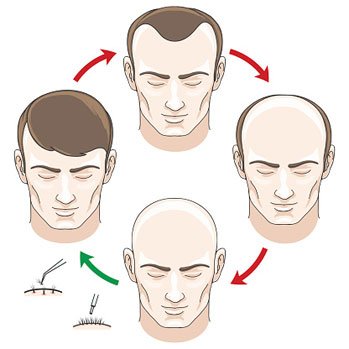The term hair transplant relates to a surgical procedure that uses sophisticated techniques to remove hairs from one area of the scalp and replace them in locations where clients are suffering thinning hair or baldness.
About hair transplants
The hair transplant procedure is ideal for men or women with pattern baldness conditions as a result of androgenetic alopecia or to treat scars due to burns or injuries.
Hair transplants are unsuitable for hair loss caused by alopecia aerate.
Deciding to have a hair transplant
Deciding to go for a hair transplant is not easy, and you should consider all the options beforehand. This is particularly the case for anybody who has had pattern baldness for some time. After all, a hair transplant will be a permanent alteration to your looks.
Of course, experiencing hair loss can be a traumatic experience for many men and women. So, opting for cosmetic procedures is one way to make a lifelong adjustment to your appearance. It can have very positive effects on some people and lead to renewed vigor and happiness.
Costs of hair transplants
Hair transplants do vary in cost tremendously, the NHS website states that a procedure can cost from £1,000 to £30,000 and these costs are reflective of the total area needing to be transplanted, as well as the surgical teams and clinics offering services of this nature.
What is the best solution?
If you decide to go for a hair transplant in the UK, you can check out the clinics offering this type of service on the website of the Quality Care Commission. They inspect these clinics and hospitals on a regular basis and offer performance ratings to enable patients to choose the best hair transplant clinic to suit their requirements.
You can also find out more about different surgeons online and discover how much experience they have in offering the hair transplant solutions you’re seeking and the numbers of operations they have conducted.
Many people opt for hair transplants overseas and Turkey is a very popular medical tourism destination for cosmetic procedures of this nature. If you decide to arrange your hair transplant in Turkey, you should check out the vera clinic and also find out just what services you will receive.
What does hair transplant entail?
You usually only require local anesthetic for hair transplants, so you will be awake throughout the entire procedure. You can expect procedures to take between six and 12 hours in total.
The two main procedures for hair transplant are FUT and FUE:
– FUT (follicular unit transplantation) involves the removal of a strip of skin with hairs from the sides or back of your head. These strips are then cut into hair grafts which have about two hairs. The grafts are inserted into bald or thinning patches of your scalp by way of small incisions.
– FUE (follicular unit extraction) is a technique which removes individual hairs from your scalp and these are then transplanted into incisions in the bald areas of the scalp.
You don’t generally need an overnight stay in a hospital or clinic following a hair transplant procedure; however, you should be offered aftercare services by your provider.
Where very large areas of the scalp are being transplanted, you may need further sessions a few months down the line.
There is no real pain involved in hair transplants once the local anesthetic has taken effect, although some patients complain of some discomfort. Additional pain relief can be supplied at the time if needed.
Recovering from hair transplant procedures
You should not drive straight after a hair transplant procedure, as the anesthetics or sedatives may take up to 24 hours to leave the body.
It’s usual to take some time off work, but most people don’t take more than three days at the most.
It takes around 14 days for the hair graft transplants to secure into the scalp fully, so you should be careful in the initial couple of weeks. After this, just follow your normal hair and skin care routines, although high-level exercising within the first month of transplants can increase risks of scarring.
Subscribe
Login
0 Comments
Oldest
